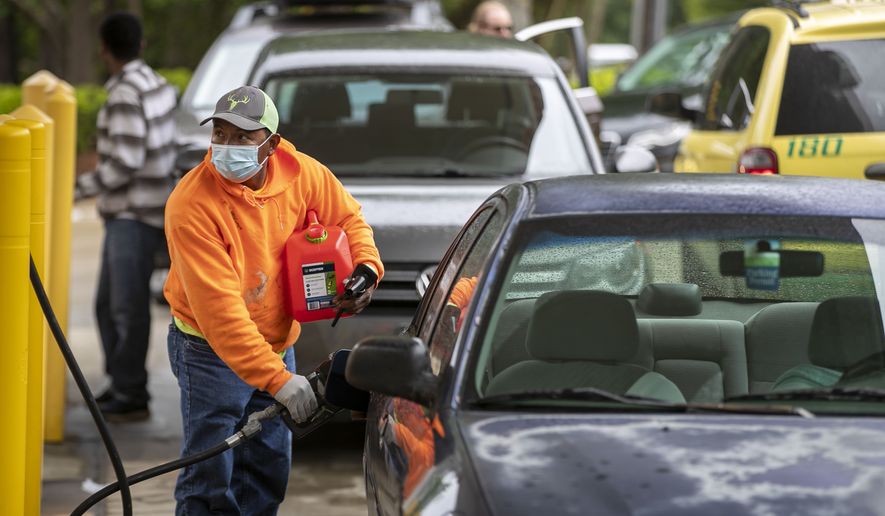President Biden’s second 100 days are off to a woeful start, including a gas shortage for much of the East Coast, a surge of inflation, a slowdown in hiring despite a record number of job openings, renewed fighting in the Middle East and an unresolved border crisis.
Consumer prices for goods and services rose 0.8% in April, the Labor Department reported Wednesday, the largest monthly jump in more than a decade. The Consumer Price Index rose 4.2% for the past 12 months, the biggest year-over-year increase since 2008.
Stocks plummeted on the inflation report, with the three major U.S. markets each losing at least 1.99% of its value. The Dow Jones Industrial Average fell 681 points to close at 33,587.
Emerging from an Oval Office meeting with Mr. Biden, House Minority Leader Kevin McCarthy said he raised with the president the issues of rising prices for gas and other goods, the border and the need to get more children back in school.
“Those numbers we heard today on inflation should terrify every American,” said Mr. McCarthy, California Republican. “It’s not a question of whether there’s going to be a tax increase — you just had the biggest tax increase you’ve had more than 10 years, and it hits you already.”
Perhaps the most unexpected crisis was the ransomware attack late last week that shut down the Colonial Pipeline, causing disruption in gasoline supplies in 12 eastern states and the District of Columbia.
In North Carolina, two-thirds of gas stations ran out of gas Wednesday, and at least 40% of the gas stations in Virginia and Georgia were empty. Transportation Secretary Pete Buttigieg again warned people against hoarding gas.
Colonial announced Wednesday afternoon that the pipeline was back up and running, though the company warned that “it will take several days for the product delivery supply chain to return to normal.”
But the crisis prompted an administration that prioritizes climate-change policies to issue waivers to allow the affected states to sell winter-blend fuel, which contributes to increased emissions and air pollution in warmer weather.
EPA Administrator Michael Regan said the waivers should not create more air pollution in the short term.
“At this time, we do not anticipate air-quality problems from these limited waivers,” he said.
Republicans accused the administration of failing to respond quickly and effectively to the range of challenges, from the economy to the renewed fighting between Palestinians and Israel.
“We’ve got a gas crisis playing out. We’ve got a war in the Middle East. We may have an inflation crisis coming,” said Sen. Ted Cruz, Texas Republican. “Biden policies are failing across the board: economically, domestically and abroad.”
Asked whether the administration is able to handle the mounting challenges, White House press secretary Jen Psaki replied, “That’s what we’re made for here.”
“The president knew from having served as vice president for eight years that when you walk in and you’re the leader of the free world and you’re overseeing a country that is still working its way through a pandemic and an economic recovery, that you have to be prepared to juggle multiple challenges, multiple crises at one time,” she said. “That’s exactly what we’re doing at this moment.”
The inflation report gave Republican leaders more ammo in their argument against Mr. Biden’s proposed tax increases, for corporations and for individuals earning more than $400,000.
“You’re watching food costs go up, housing costs go up, lumber costs,” Mr. McCarthy said. “There is inflation everywhere, so raising taxes is the biggest mistake you could make.”
Senate Minority Leader Mitch McConnell, who also attended the White House meeting, said the Senate GOP has a “red line” on raising taxes to pay for Mr. Biden’s $4 trillion in infrastructure spending.
“We’re not interested in reopening the 2017 tax bill,” the Kentucky Republican said. “We both made that clear to the president. That’s our red line. We believe that in February of 2020, we had the best economy we’ve had in 50 years. We believe that was a major reason for it.”
The tax cuts under former President Trump lowered the corporate tax rate to an average of 21%. Mr. Biden has proposed raising it to 28%.
Ms. Psaki, citing studies by the White House Council of Economic Advisers, said the rise in prices was expected and should be temporary, as the country “is experiencing a massive transition from the slowdown during the pandemic to flipping the switch back on.”
She said airfares have increased by 10% but “are still almost 20% below pre-pandemic price levels,” and that rising hotel prices are still below pre-pandemic levels.
She also said the rising prices reflect “supply chain pressure,” citing the example of higher prices for used cars and trucks because a shortage of semiconductor chips has resulted in fewer new cars available.
Turning to the gas shortages, Mr. McCarthy said the nation has not experienced such gasoline lines “since [Jimmy] Carter was president.”
“The idea that spending more trillions of dollars into this economy when you have a supply constraint is actually the reverse that you want to do to keep America [growing], and make sure we don’t have the inflation going,” he said.
From his base in southern Florida, Mr. Trump taunted the president that comparisons to Mr. Carter are “very unfair to Jimmy Carter.”
“Jimmy mishandled crisis after crisis, but Biden has created crisis after crisis,” Mr. Trump said. “First there was the Biden Border Crisis (that he refuses to call a crisis), then the Biden Economic Crisis, then the Biden Israel Crisis, and now the Biden Gas Crisis. Joe Biden has had the worst start of any president in United States history, and someday, they will compare future disasters to the Biden administration — but no, Jimmy was better!”
• Dave Boyer can be reached at dboyer@washingtontimes.com.




Please read our comment policy before commenting.